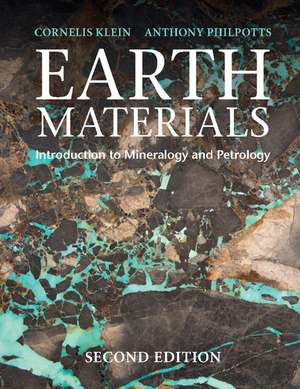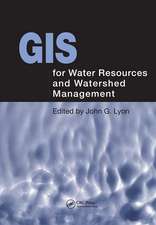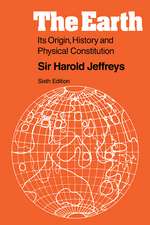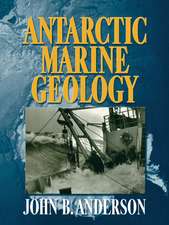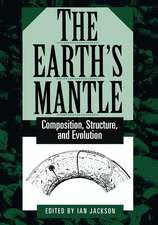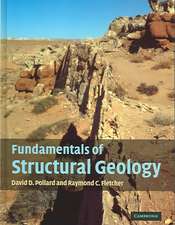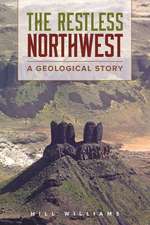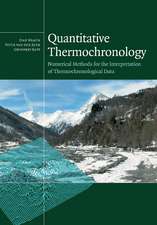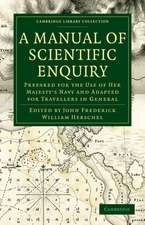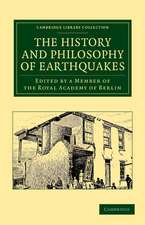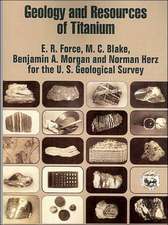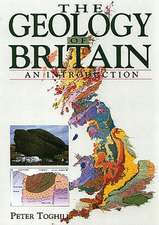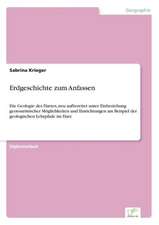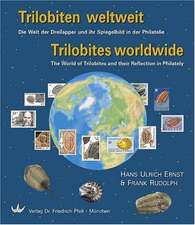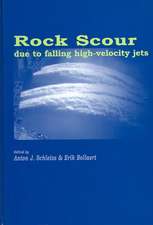Earth Materials: Introduction to Mineralogy and Petrology
Autor Cornelis Klein, Anthony Philpottsen Limba Engleză Paperback – 14 dec 2016
Preț: 397.31 lei
Nou
Puncte Express: 596
Preț estimativ în valută:
76.03€ • 82.56$ • 63.87£
76.03€ • 82.56$ • 63.87£
Carte disponibilă
Livrare economică 01-15 aprilie
Livrare express 15-21 martie pentru 70.100 lei
Preluare comenzi: 021 569.72.76
Specificații
ISBN-13: 9781316608852
ISBN-10: 1316608859
Pagini: 616
Ilustrații: 1076 colour illus. 30 tables 360 exercises
Dimensiuni: 220 x 275 x 22 mm
Greutate: 1.45 kg
Ediția:2Revizuită
Editura: Cambridge University Press
Colecția Cambridge University Press
Locul publicării:New York, United States
ISBN-10: 1316608859
Pagini: 616
Ilustrații: 1076 colour illus. 30 tables 360 exercises
Dimensiuni: 220 x 275 x 22 mm
Greutate: 1.45 kg
Ediția:2Revizuită
Editura: Cambridge University Press
Colecția Cambridge University Press
Locul publicării:New York, United States
Cuprins
1. Introduction; 2. Materials of the solid Earth; 3. How are minerals identified?; 4. Fundamentals of crystal structures; 5. Introduction to crystallography; 6. Minerals and rocks observed under the polarizing optical microscope; 7. Igneous rock-forming minerals; 8. The direction and rate of natural processes: an introduction to thermodynamics and kinetics; 9. How do igneous rocks form?; 10. Igneous rocks: their mode of occurrence, classification, and plate tectonic setting; 11. Sedimentary rock-forming minerals and materials; 12. Formation, transport, and lithification of sediment; 13. Sedimentary rock classification, occurrence, and plate tectonic significance; 14. Metamorphic rock-forming minerals; 15. Metamorphic rocks; 16. Some economic minerals, mainly from veins and pegmatites; 17. Some selected Earth materials resources; 18. Earth materials and human health.
Recenzii
'Earth Materials is a magnificent textbook that illustrates in a wonderful way how petrology and mineralogy relate to our planet Earth, its formation and modification by igneous, metamorphic and sedimentary processes. Outstanding photographs and detailed thin section images are neatly combined with clear illustrations, fostering the link between observations and fundamental theoretical principles. A new section in the second edition about thermodynamics and kinetics nicely complements the thorough coverage of key concepts in petrology and mineralogy. The available online resources are an essential aid for teaching, and students will benefit from the review questions at the end of each chapter. Earth Materials is simply a great textbook, which I can highly recommend.' Ralf Halama, Keele University
'Earth Materials captures the fundamentals of mineralogy and petrology in a one-semester text in a surprisingly thorough and direct way. This book can be successfully used for both one-semester courses and two-semester sequences. My students appreciate the clear, color images, and I appreciate the depth of information provided.' Christine M. Clark, Eastern Michigan University
'There is an increasing trend to condense mineralogy and petrology into a one semester course, and Earth Materials - An Introduction to Mineralogy and Petrology authored by Klein and Philpotts, provides the perfect textbook for such a course. It is extensive enough to supply fundamental information on mineralogy and petrology separately, while also seamlessly integrating these two subjects into a cohesive entity. Most impressive to me are the extensive colour figures and thin sections for most of the rock types.' Zhaohui (George) Li, University of Wisconsin
'I have used this textbook in my undergraduate Earth Materials course since its publication in 2013, and the second edition adds important new elements, including a more comprehensive treatment of thermodynamics and phase equilibria. The components that made the first edition so welcome are still here: the integration of crystallography with sedimentary, igneous, and metamorphic geology; the colorful images of atomic structures, minerals and geologic localities; and the consideration of the role that minerals play in our society. It is by far the best text for those of us who have to cover all the mineralogical and petrological bases in one semester.' Peter J. Heaney, Pennsylvania State University
'I really like the way this book organizes the subjects of mineralogy and petrology to emphasize the connection between plate tectonics, mantle processes, mineral stability, and rock composition. Teaching with this organization clearly reinforces the big picture of geologic processes while digging into enough depth in each subject area to prepare students to tackle integrated geologic problems.' Alexis Sitchler, Colorado School of Mines
'Brilliant! Absolutely brilliant! A landmark text in the Earth Sciences for modern times! The color illustrations, figures and photographs of all things geologically important, accompanied by lucid text, will seductively attract young minds. The chapters covering wide-ranging topics are all relevant for 21st century students of Earth and material science. I can't think of a better text that is a 'must buy' for our undergraduates.' Asish R. Basu, University of Texas, Arlington
'This latest edition includes a number of new topics …The authors discuss concepts such as heat, work, internal energy, enthalpy, Gibbs free energy, and entropy in a simple, intuitive fashion that most any reader can understand and appreciate … Phase diagrams show the stability fields of minerals in terms of temperature and pressure, and temperature and composition. Another addition to the book is a section on the use of hydraulic fracturing to extract shale oil and gas prospects and its implications on the environment. The authors treat this last topic in a fair and open manner, admitting the potential risks, but also acknowledging the benefits of having this technology to meet the world's energy needs.' The Leading Edge
'Earth Materials captures the fundamentals of mineralogy and petrology in a one-semester text in a surprisingly thorough and direct way. This book can be successfully used for both one-semester courses and two-semester sequences. My students appreciate the clear, color images, and I appreciate the depth of information provided.' Christine M. Clark, Eastern Michigan University
'There is an increasing trend to condense mineralogy and petrology into a one semester course, and Earth Materials - An Introduction to Mineralogy and Petrology authored by Klein and Philpotts, provides the perfect textbook for such a course. It is extensive enough to supply fundamental information on mineralogy and petrology separately, while also seamlessly integrating these two subjects into a cohesive entity. Most impressive to me are the extensive colour figures and thin sections for most of the rock types.' Zhaohui (George) Li, University of Wisconsin
'I have used this textbook in my undergraduate Earth Materials course since its publication in 2013, and the second edition adds important new elements, including a more comprehensive treatment of thermodynamics and phase equilibria. The components that made the first edition so welcome are still here: the integration of crystallography with sedimentary, igneous, and metamorphic geology; the colorful images of atomic structures, minerals and geologic localities; and the consideration of the role that minerals play in our society. It is by far the best text for those of us who have to cover all the mineralogical and petrological bases in one semester.' Peter J. Heaney, Pennsylvania State University
'I really like the way this book organizes the subjects of mineralogy and petrology to emphasize the connection between plate tectonics, mantle processes, mineral stability, and rock composition. Teaching with this organization clearly reinforces the big picture of geologic processes while digging into enough depth in each subject area to prepare students to tackle integrated geologic problems.' Alexis Sitchler, Colorado School of Mines
'Brilliant! Absolutely brilliant! A landmark text in the Earth Sciences for modern times! The color illustrations, figures and photographs of all things geologically important, accompanied by lucid text, will seductively attract young minds. The chapters covering wide-ranging topics are all relevant for 21st century students of Earth and material science. I can't think of a better text that is a 'must buy' for our undergraduates.' Asish R. Basu, University of Texas, Arlington
'This latest edition includes a number of new topics …The authors discuss concepts such as heat, work, internal energy, enthalpy, Gibbs free energy, and entropy in a simple, intuitive fashion that most any reader can understand and appreciate … Phase diagrams show the stability fields of minerals in terms of temperature and pressure, and temperature and composition. Another addition to the book is a section on the use of hydraulic fracturing to extract shale oil and gas prospects and its implications on the environment. The authors treat this last topic in a fair and open manner, admitting the potential risks, but also acknowledging the benefits of having this technology to meet the world's energy needs.' The Leading Edge
Notă biografică
Descriere
Designed specifically for one-semester courses, this beautifully illustrated textbook explains the key concepts in mineralogy and petrology.
